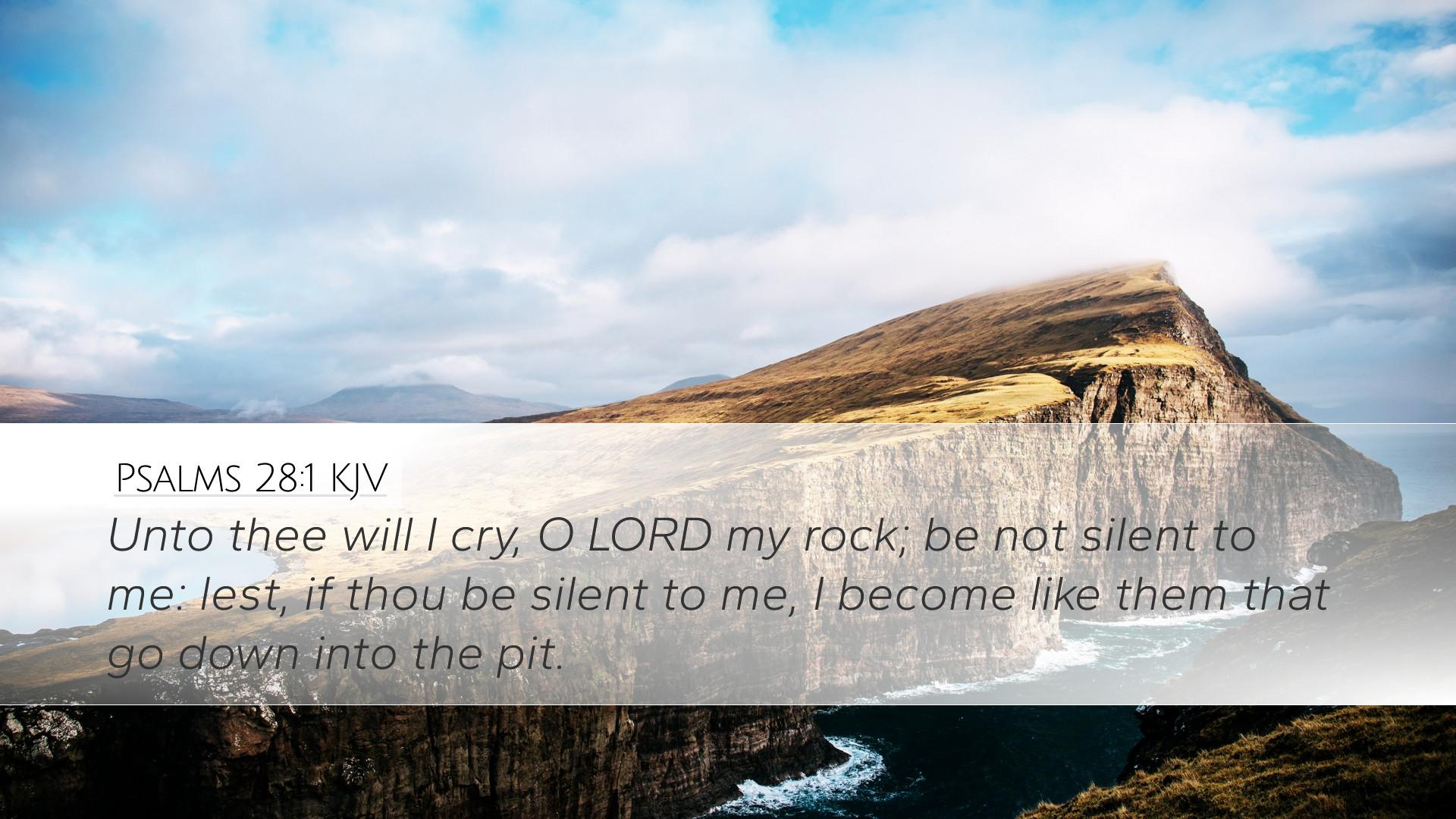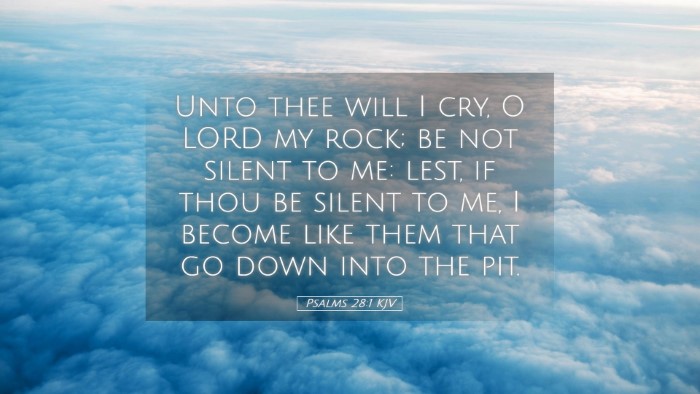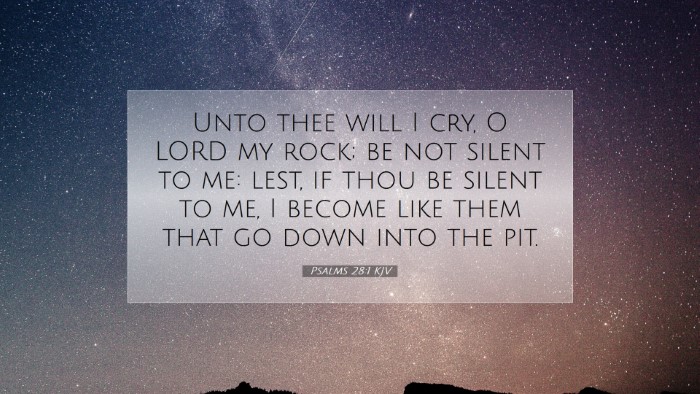Commentary on Psalms 28:1
Verse: "Unto thee will I cry, O Lord my rock; be not silent to me: lest, if thou be silent to me, I become like them that go down into the pit."
Introduction
The urgency expressed in Psalms 28:1 reflects a heart in distress and a soul seeking divine assistance. This verse presents a passionate plea to God, illustrating the profound reliance the psalmist has on the Lord as a rock—symbolizing stability and safety. This commentary synthesizes the insights of renowned biblical scholars such as Matthew Henry, Albert Barnes, and Adam Clarke to elucidate the theological significance of this verse.
Contextual Analysis
Understanding the psychological and spiritual context behind this psalm is critical. The psalmist is experiencing deep turmoil, possibly stemming from feelings of abandonment or isolation. Henry notes the dual nature of God’s relationship with humanity as one of both moral authority and personal connection. The psalmist's "cry" signifies both desperation and hope, forming a crucial element of ancient Hebrew prayer practices.
Spiritual Plea and Divine Relationship
The opening phrase, "Unto thee will I cry," sets a tone of earnest prayer. Clarke emphasizes that calling upon God indicates an acknowledgment of His greatness and an inherent belief in His power to intervene. It showcases the believer's dependency on God’s mercy. The relational aspect is evident; the plea is both reverential and familiar—addressing God as "my rock" illustrates a deep personal trust.
The Nature of God as Rock
The term "rock" connotes several layers of meaning. Barnes explicates that it represents the psalmist's understanding of God as a reliable fortress during times of trouble. The metaphor suggests stability, strength, and unwavering support. Historical contexts, such as ancient warfare, reveal that rocks provided shelter and protection, aligning with the psalmist's faith in God's protective nature.
The Danger of Divine Silence
The verse continues with a stark warning: "be not silent to me." This stark request reflects the dire consequences perceived in the absence of God's voice. Henry articulates that divine silence may lead to a sense of abandonment or despair, likening it to a descent "into the pit," which symbolizes death or separation from life and joy. The urgency translates to an understanding that genuine communion with God is vital for spiritual vitality.
Consequences of Silence
The phrase "lest, if thou be silent to me, I become like them that go down into the pit" provokes profound introspection. The psalmist fears the spiritual and psychological repercussions of feeling forsaken. Clarke elaborates that the pit conveys a state of hopelessness and loss of direction. For the psalmist, silence from God would equate to the cessation of life, both spiritually and practically.
Theological Implications
Psalms 28:1 invites an exploration of profound theological themes such as divine communication, human vulnerability, and the quest for reassurance amidst trials. The personal nature of this psalm resonates with believers who often grapple with similar feelings of abandonment.
The Nature of Prayer
Prayer as depicted in this verse serves multiple functions: it is an act of worship, a declaration of dependence, and a vehicle for expressing the full range of human emotions. The passionate plea emphasizes the necessity of an ongoing dialogue with God, reinforcing the belief that prayer is vital for navigating life's complexities.
The Importance of Community
This verse, in its invocation of urgent prayer, also reminds the community of faith about the collective nature of supplication. In difficult seasons, the church must reinforce its support for individuals, echoing their cries and amplifying their prayers. Here, communal intercession becomes a lifeline that reflects the shared journey of faith.
Faith Amidst Trials
The psalmist embodies the essence of faithful lament—a recognition of pain coupled with unwavering reliance on God. Barnes asserts that this dual expression encourages believers to voice their struggles sincerely, demonstrating that lament is an acceptable posture in the life of faith—endorsing the authentic relationship God desires with His people.
Application for Today’s Believers
Incorporating the insights from this psalm can profoundly affect contemporary believers, pastors, and scholars alike. Here are several applicational points derived from the commentary:
- Recognize God as Your Rock: Cultivate a personal understanding of God as your sanctuary and unwavering support, especially in times of distress.
- Embrace Vulnerability in Prayer: Approach God with honesty during prayer; express your fears, doubts, and needs without reservation.
- Cultivate Community Intercession: Foster an environment of prayer within your community, where mutual support is evident during trials.
- Acknowledge God’s Voice: Remain attentive to God’s guidance and responses, recognizing that silence may indicate a period of testing or a call to deeper faith.
Conclusion
Psalms 28:1 offers a poignant reminder of the need for intimate communion with God, especially during perilous times. As scholars and practitioners of the faith, recognizing and interpreting the emotional weight of this verse allows a richer understanding of the human-divine relationship. Through prayer, reliance on God as a rock, and communal support, believers can navigate the challenges of life with the assurance of God’s enduring presence.


